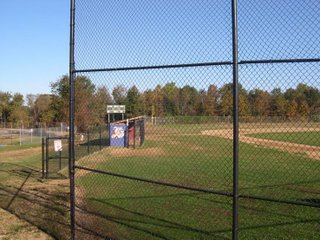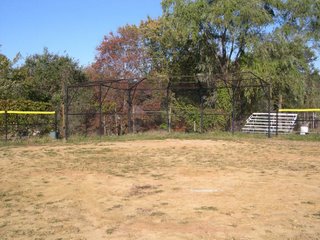But in Prince George’s County, Maryland, a story that started off similarly to Coach Jackson’s took a drastically different path to resolution. Community activists, including a local softball umpire named Jack Mowatt, noticed disparities in the playing conditions for male and female athletes. For example, the boys at Bowie High School played baseball on a field that looked like this:

While the girls at Bowie High School played on one that looked like this:
 It wasn't just the fields' appearances that caused alarm. The girls' fields had safety problems that the boys' fields didn't have. One had low baseline fences that didn't offer the bench any protection from foul balls. Another had a dropoff just steps from the left field line, making it impossible to safely attempt catches in foul territory. Mowatt was so concerned told the county he would no longer serve as umpire under these conditions.
It wasn't just the fields' appearances that caused alarm. The girls' fields had safety problems that the boys' fields didn't have. One had low baseline fences that didn't offer the bench any protection from foul balls. Another had a dropoff just steps from the left field line, making it impossible to safely attempt catches in foul territory. Mowatt was so concerned told the county he would no longer serve as umpire under these conditions.Title IX requires a program-to-program, rather than sport-to-sport comparison. So the disparities in softball and baseball fields did not alone create a Title IX violation. But when NWLC and community activists looked into the programs county wide, they found disparities in participation rates, scheduling, equipment, and funding.
Fortunately, a demand letter from NWLC followed by negotiations lead to a county-wide agreement in August 2006. The county school district not only agreed to full compliance with the Title IX regulations, it even agreed to a few things beyond what the regs require, such as publically self-auditing their compliance going forward and proportionate funding for boys' and girls' programs.
In the end, the school district was so on-board that it announced the agreement in a joint press conference with NWLC. The board president herself called it a prototype for other districts. I hope what really turns out to be the prototype for other districts is the cooperative approach among all concerned that lead to an effective and efficient resolution of compliance problems.
(photo credits to Jack Mowatt, posted with his permission)
2 comments:
Title IX is a good thing, but I think one should get their facts correct. The ball field example as shown at Bowie High School is not an accurate representation. Neither the Baseball nor Softball fields get adequate funding via the PGCPS. The baseball field is cared for by a group of dedicated, hard working parents through many hours of hard work. Support for the field is accomplished through fund-raising and charitable donations from the Bowie community not the school system.
I agree with the previous blogger.
The PGCPS has not invested in the infrastructure of their sports facilities countywide for both female and male sports. Parent volunteers have raised $ for the track at BHS, the baseball and softball fields etc. There are NO usable tennis courts at BHS for the girls or boys. There are not enough facilities for all the PE classes which are co-ed. I have been to 90% of the softball and baseball fields in the county and the only ones that are maintained adequately are done so by the PARENTS with their own $ or at the brand new schools. The old schools' facilities are in dismal condition. ALL the fields in the county should be made safe for play.
Facilities inside the beltway have been neglected for years.
Post a Comment